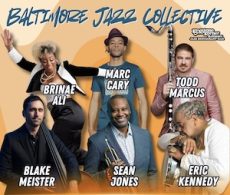
BALTIMORE JAZZ COLLECTIVE
Founded in 2019 at Keystone Korner Baltimore, the Baltimore Jazz Collective is making its Homecoming Return! Music and spirituality have always been fully intertwined in the artistic vision of trumpeter, bandleader, composer, educator and activist Sean Jones. With boundless passion, energy, and soul, Baltimore Jazz Collective explores the inner and outer frontiers of melody, harmony and time itself.
Sean Jones | Trumpet/Bandleader
Brinae Ali | Keys
Todd Marcus | Saxophone/Clarinet
Marc Cary | Piano
Blake Meister | Bass
Eric Kennedy | Drums
Cover: $35.00 ~ $45.00 + fee
Streaming: $15.00 + fee
More Posts: adventure,bandleader,bass,clarinet,drums,genius,instrumental,jazz,music,piano,preserving,saxophone,travel,trumpet,vocal
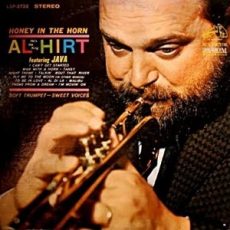
Daily Dose Of Jazz…
Alois Maxwell Hirt was born on November 7, 1922 in New Orleans, Louisiana to a police officer father. At the age of six, he got his first trumpet, which had been purchased at a local pawnshop. He played in the Junior Police Band with friend Roy Fernandez, the son of Alcide Nunez. By 16 he was playing professionally with his friend Pete Fountain, while attending Jesuit High School. During this time, he was hired to play at the local horse racing track, beginning a six-decade connection to the sport.
1940 saw Al in Cincinnati, Ohio studying at the Cincinnati Conservatory of Music with Dr. Frank Simon. After a stint as a bugler in the Army during World War II, he performed with various swing big bands, including those of Tommy Dorsey, Jimmy Dorsey, Benny Goodman, and Ina Ray Hutton.
In 1950 Hirt became the first trumpet and featured soloist with Horace Heidt’s Orchestra and after several years on the road he returned to New Orleans working with various Dixieland groups and leading his own bands. He soon signed with RCA Victor and posted twenty-two albums on the Billboard charts in the 1950s and 1960s. He recorded the theme for the 1960s television show The Green Hornet, with arranger and composer Billy May.
From the mid-1950s to early 1960s, Hirt and his band played nightly at Dan’s Pier 600, hosted the hour-long television variety series Fanfare, as the summer replacement for Jackie Gleason and the American Scene Magazine, and would go on to play for Pope John Paul II.
Trumpeter and bandleader Al Hirt died of liver failure on April 27, 1999 at the age of 76, after having spent the previous year in a wheelchair due to edema in his leg.
More Posts: bandleader,history,instrumental,jazz,music,trumpet
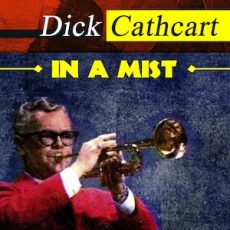
Daily Dose Of Jazz…
Charles Richard Cathcart was born on November 6, 1924 in Michigan City, Indiana. He was a trumpeter for the U.S. Army Air Force Band, and was a member of big bands led by Bob Crosby, Ben Pollack, and Ray Noble.
After World War II he moved to Los Angeles. His friend Jack Webb was playing the part of trumpeter Pete Kelly in the movie Pete Kelly’s Blues and told Cathcart he should supply the music. The band from the movie stayed together in the 1950s for performances and recordings under the name Pete Kelly’s Big Seven.
Cathcart also supplied music for the television show Dragnet, which starred Jack Webb as Joe Friday. He spent much of his career from 1962 to 1968 as a musician on The Lawrence Welk Show. On the Welk show, he met Peggy Lennon, a singer with the Lennon Sisters, and the two married.
Trumpeter Dick Cathcart, who played in both Dixieland and big band genres, died on November 8, 1993 in Los Angeles, California.
More Posts: history,instrumental,jazz,music,trumpet
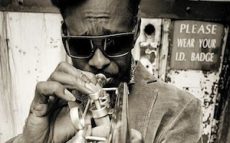
THE ABNEY EFFECT
Chicago born and raised jazz trumpeter Mario Abney now of New Orleans fuses traditional and extended trumpet techniques in a most inventive way; his strikingly personal instrumental vision endows the music with an infinite array of tonal color. Recognized for his ability to create pure musical dialog, and hear music in a universally spiritual way, he is definitely one of New Orleans most pioneering young jazz musicians.
Marioʼs first experience hearing jazz was the music of trumpeter Wynton Marsalis. After jazz trumpet peaked his interest in music Mario began to absorb the music of Louis Armstrong, Dizzy Gillespie, Miles Davis, and all the great trumpeters who pioneered the music. In 2001, after several years of playing as a side man Abney was inspired to lead his own Quintet. During a performance at the Dayton RiverWalk festival in 2007 Mario became interested in going to New Orleans after hearing the Hot 8 Brass Band perform. By spring of 2008 Abney and two members from his quintet moved to New Orleans to absorb its rich musical culture and become part of the music scene.
Cover: $15.00
More Posts: adventure,bandleader,club,genius,instrumental,jazz,music,preserving,travel,trumpet
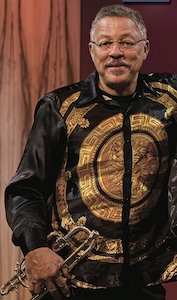
LONGINEU PARSONS ENSEMBLE
Unity Jazz presents trumpeter Longineu Parsons and his Ensemble featuring pianist Nat Adderley Jr. with special guest vocalist Myrna Clayton.
The career of Longineu Parsons, with its many musical pieces and parts, serves as a metaphor for what he calls “the disorder of the human tribe.” The whole of Longineu Parsons is greater than the sum of his parts, and he has made it his mission – and the mission of his own Tribal Disorder Records – to use music as “a force against disorder in the human tribe.”
In his own life and career, this “disorder” has come in the form of widely diverse musical passions and pursuits. Growing up in Jacksonville, Florida, Parsons instinctively plays the blues as a native language. After cutting his teeth playing hometown gigs starting in junior high, he toured on the Chitlin Circuit for a few years before attending Florida A&M University for his undergraduate degree.
There, two pivotal experiences would help set his course. The first was that he heard the John Coltrane album “Expression” – it opened his ears and changed his life. Though he was already into Miles Davis and “Bitches Brew,” something was different about this. Secondly, he met the famous trumpeter (and FAMU alum) Nat Adderley. Nat took Longineu under his wing and over time, mentor and protégé became lifelong friends. Longineu is honored to play Nat’s cornet as his main horn.
Tickets: $50.00 | CashApp: $UnityJazz / Zelle: 7708991991
Free Parking
More Posts: adventure,bandleader,genius,instrumental,music,preserving,trumpet,vocal


